‘Bates Motel’ Series Finale Postmortem: EPs Talk the Ending They’d Planned From the Beginning
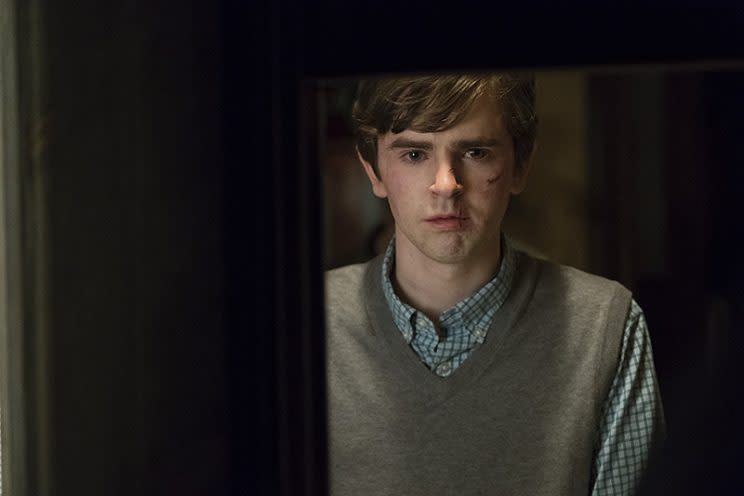
Warning: This interview for “The Cord,” the series finale episode of Bates Motel, contains storyline and character spoilers.
Bates Motel series creators Kerry Ehrin and Carlton Cuse promised that the entire series — including the finale — would honor the flavor of Hitchcock’s Psycho but in no way be obliged to follow the movie’s exact storyline or ending. If you kept that in mind, the death of Norman Bates (Freddie Highmore) in Monday’s series finale might not have been such a shocker. OK, it was still pretty shocking, but it also seemed like the sad but inevitable ending for the tortured Norman.
As for who was left standing: not former White Pine Bay sheriff and stepfather of Norman, Alex Romero (Nestor Carbonell), who had busted out of prison for the sole purpose of killing Norman in revenge for Norman killing Romero’s bride, Norma (Vera Farmiga). Instead, Norman got the best of the grief-stricken Romero and shot him as the two of them paid a visit to Norma’s body, buried in the snowy woods.
Norman’s death came courtesy of his half-brother, Dylan (Max Thieriot), who had tried throughout the series to get Norman and Norma to admit that Norman had some serious mental health issues that needed addressing. Dylan tried again, during a creepy, and — as has been a series trademark — darkly funny final family dinner, but ended up mortally shooting Norman in self-defense. Norman’s final words were to thank his brother for reuniting him with his dead mother.
Ehrin and Cuse broke down the series ender for Yahoo TV, including confirmation on what was ultimately a happy (and not originally planned) ending for Dylan and Emma, what the point of no return was for Alex Romero, and whether Norman’s fate was written before he was born, thanks to his mother’s tragic life.
And, though he didn’t quite make it to the finale, they also shared the deliciously meta inspiration for Ryan Hurst’s scene-stealing Chick.
First, can we confirm that Dylan and Emma are together at the end? Things were rocky, she wasn’t sure she could be with him after everything that happened with her mother, but they kiss each other on the lips when they meet up in the final scene.
Carlton Cuse: Yes. Our intention was they somehow in the midst of all the tragedy .. Kerry and I wanted Emma and Dylan to have a happy ending, and somehow out of this tragedy, they forged a bond that has left them in a good place. They’re the hopeful ending to a story that’s really, as we kind of prescribed it, a romantic tragedy.
Kerry Ehrin: I think also Dylan was the one who allows the most therapeutic enlightenment into his brain. In a way, he was the one who allowed himself to see mostly the truth, and I think that’s what saved him, as well as meeting the love of his life. Those are two pretty good life rafts.
No one else really understands Norman’s illness at all, nor is really trying to… One of my favorite lines in the finale is when Romero and Norman are in the car and Romero begins berating Norman when Norman appears to be talking to himself. Norman/“Mother” says, “You’re just above it all, aren’t you, Sheriff Lonelyheart?” It’s such a Norma thing to say, and you’re thinking that Romero should recognize that, but of course he doesn’t understand about Norman’s illness. Nor does Sheriff Greene or Madeleine or any of the other people who are judging him. But Dylan does. Dylan makes the effort to, at least.
Ehrin: That’s true, and I think also for Romero, he just doesn’t give a s**t. He’s propelling himself on a dark course, and it’s pretty much shut out anything else at that point. But Dylan is always open to finding the truth and understanding it with Norman.
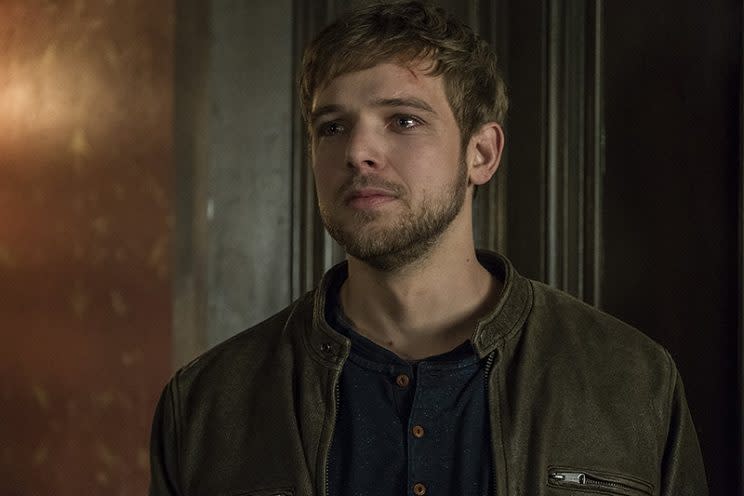
The finale title, “The Cord” — is that as in “cutting the cord,” which has finally happened with Norman’s death?
Cuse: It goes back to the pilot episode, where Kerry wrote this wonderful speech where Norman and Norma are in this rowboat dumping Keith Summers, the first of many victims… let’s say “bodies” that fell during the course of our series. And Norma talks about how there’s a cord between their hearts, and it’s about this unassailable bond that exists between Norman and Norma. In a way, this finale is about how that bond transcends everything, even death.
Is this the finale that you started with, that you knew you wanted to get to?
Cuse: It is. The specifics of it obviously couldn’t exist until the other 49 episodes had been written, but yes. I have to say, this has been an extraordinary experience where Kerry and I have really been able to make the show that we wanted to make, in the way we wanted to make it. It’s really been a joy, and we’ve been incredibly supported by A&E and by Universal Television. We always imagined that the end of the show would be Norman and Norma couldn’t find happiness in this world. Maybe only in someplace beyond this world can the two of them actually have what they’ve always wanted.
Ehrin: Or the darker version is that they couldn’t exist in this world. That’s the thing about codependent love, is that it’s so huge and overwhelming, and you can’t really replace it with normal love. At the end of the day, it’s better to just turn the light out. Who knows what happens after we die? In the tradition of Wuthering Heights, you have people who are so in love, who aren’t supposed to be together and couldn’t make it fit into the world they lived in, and it killed them all. It just killed them all. That’s the dark tragedy of it, but it’s also sort of the beauty of it… about what you have in life. When you have those connections that are so profound in life, and that in itself is worth being born for.
Cuse: Kerry, let’s not fully exclude the possibility of happiness in the afterlife, though.
Ehrin: I guess I’m too much of a karma believer. Norman did a lot of bad s**t. I don’t know if the two of them are in a kind of limbo or something.
Cuse: Maybe they should go on The Good Place.
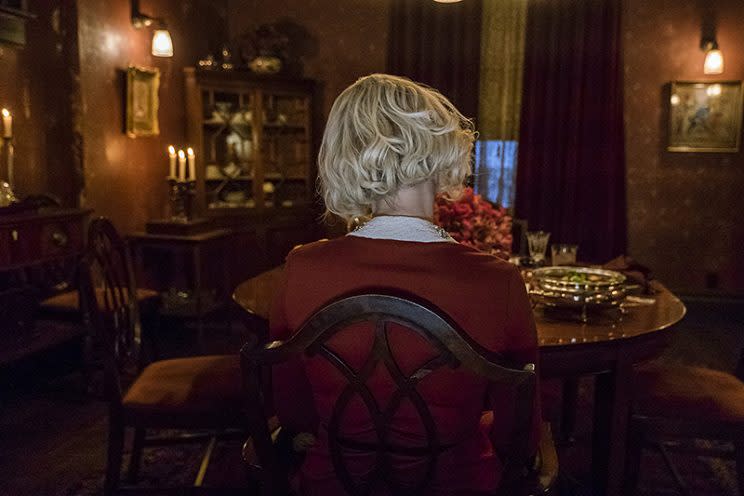
That would be the ultimate! A prequel sequel on a totally different series. Especially in the final two episodes, I think you start to realize the show in a lot of ways has been as much Dylan’s story as Norma’s and Norman’s. He’s the one looking on and looking in at them individually and at their relationship. He’s the one who knows about each of them and them together but can’t stop it without sacrificing himself. He has a tremendous amount of guilt about that. Do you think it is as much his story as theirs ultimately?
Ehrin: Oh, yeah.
Cuse: I don’t know, I don’t think it’s as much Dylan’s story. We’ve always got Dylan as the normal prism on these characters. Both Norman and Norma had such strongly subjective views of the world that we thought Dylan would be the normal guy, that the viewer can watch the story unfold through his eyes. We saw him as a character who was kind of the closest and most critical observer of this romantic pairing that really is superpassionate but isn’t really supposed to exist.
Ehrin: But don’t you think he’s kind of like Nick in The Great Gatsby? He’s the outside observer, but The Great Gatsby wouldn’t be the same without Nick. Dylan is truly integrated into the storytelling in that sense of being the observer and being the last man standing.
Cuse: Yeah, he’s obviously very much a part of the story, but .. initially he came into being as a way to show that we weren’t doing Psycho. Norman doesn’t have a brother in Psycho, and it was just a way to help define that we were telling our own story.
It feels especially appropriate that Dylan is the one who’s there with Norman at the end. At least it is someone who genuinely cared for Norman and tried to understand him and unselfishly get him help.
Ehrin: Yeah, and part of the show is about family. The fact that Norman is able to die in his loving brother’s arms is very meaningful, as opposed to being gunned down by a police squad or taking his own life or Romero killing him or any of the other options. It was a way to have a feeling that Norman was being brought “home.” He’s achieving peace finally in his brother’s arms.
And Dylan’s pain throughout the series was that he could never break into that closeness, that bond, between Norma and Norman. In a way, he finally had a real role in their relationship.
Cuse: He always had a role in their relationship. We explored the triangular relationship of the two brothers, one on the outside, one on the inside. What are the consequences of that. As Kerry said, he’s been very much a part of the storytelling; it just felt at the end of the day that Dylan was the right character to have that final confrontation with Norman. It’s something that we talked about really early on. It evolved and worked out. He entered the story at the very beginning, and his return to the family marked the beginning of the show. It felt appropriate that he would be there at the event that marks the end of our show.
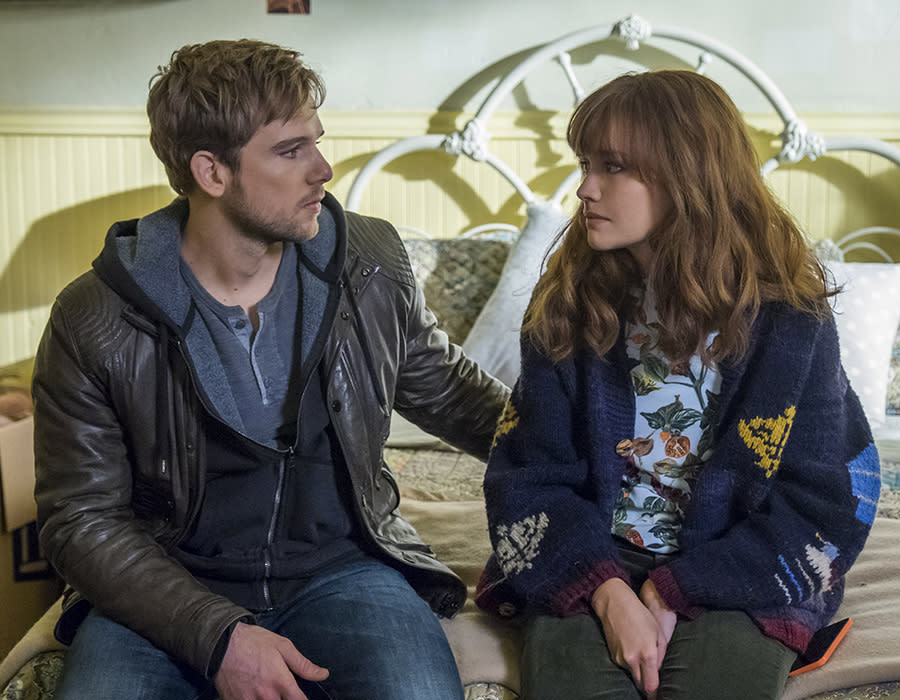
Did you always intend that Emma and Dylan would end up together?
Cuse: The funny thing is, I would say that if there’s one thing we didn’t plan from the very beginning of the show, it was that Dylan and Emma would get together. Television shows are kind of organic entities, and as you make them, you listen to your show; and as the show began to evolve, we began to see that there was real possibility for Dylan and Emma to have a relationship. Once it happened, and we realized how good they were together, Kerry and I were like, “We have to leave the show with one ray of hope, one positive outcome, and that’s going to be Dylan and Emma’s relationship.” But at the same time, I think it was important that it not be sugar-coated, and that the stuff at the end of the series beautifully reflects that even good and enduring relationships are complicated. That was the intention.
We talked a bit about Romero earlier: This isn’t just a Bates family tragedy; it’s a tragedy for Romero, who was not on a track with a completely happy life himself. He had a lot of different things going on before he met Norma. In the end, do you think his character would say that his brief happiness of finding this true love with Norma was worth it?
Ehrin: Yes.
Cuse: Yes.
Did you consider any other option for how his story would end? Or was he pretty much doomed maybe from the time that he fell in love with Norma?
Ehrin: I would have to say his path was the one that we tried out a lot of different turns on, because he’s such a good guy, and there’s a part of me that really wants him to make it out alive. But it also felt like, given who he was, given how he lived his life, how angry he would be at her death, that he would get on this revenge mission, which really consumed him to the point where he stops thinking about what Norma would want. Because Norma would never want him to kill her son. Under any circumstances. She would’ve wanted him to try to help Norman. To me, that’s where he chose his fate. In a weird way, he stopped thinking about the woman he loved, and he just wanted to put out this fire that was inside of him, and that’s what took him down this path.
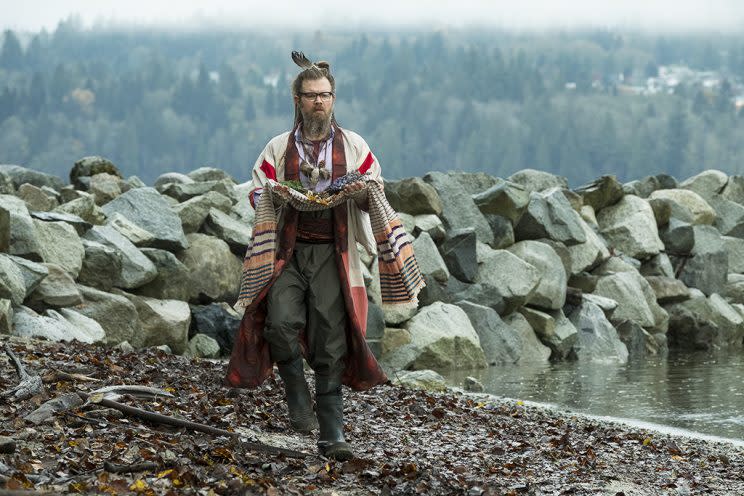
Is there anyone else along the way who died, but almost didn’t? Chick, for example. I think none of us expected Chick to be around as long as he was, but he almost made it to the end.
Ehrin: Chick is a ball!
Cuse: Chick is one of those characters that… Ryan Hurst brought him to life in a way that we never could have expected. Ryan made him this complex, always compelling character. One of our writers, Scott Kosar, is very well versed in the history of serial killers and was always talking about Ed Gein, who was the serial killer who was the model for Robert Bloch’s original book. So we thought, “Wouldn’t it be cool if Chick, in this meta way, became this stand-in for Robert Bloch?” There was almost this level of commentary on our storytelling that would come through him, and he would be in this really interesting place as a guy who sees himself as being an objective observer, but in reality, he’s not that at all. Ultimately, this idea that he can really be doing that is a full-of-s**t idea, and that’s why he got gunned down.
And the typewriter, his dead head falling on the typewriter, is especially poetic, then.
Ehrin: Yeah. That was a great scene. Freddie directed that episode, and I do love that scene.
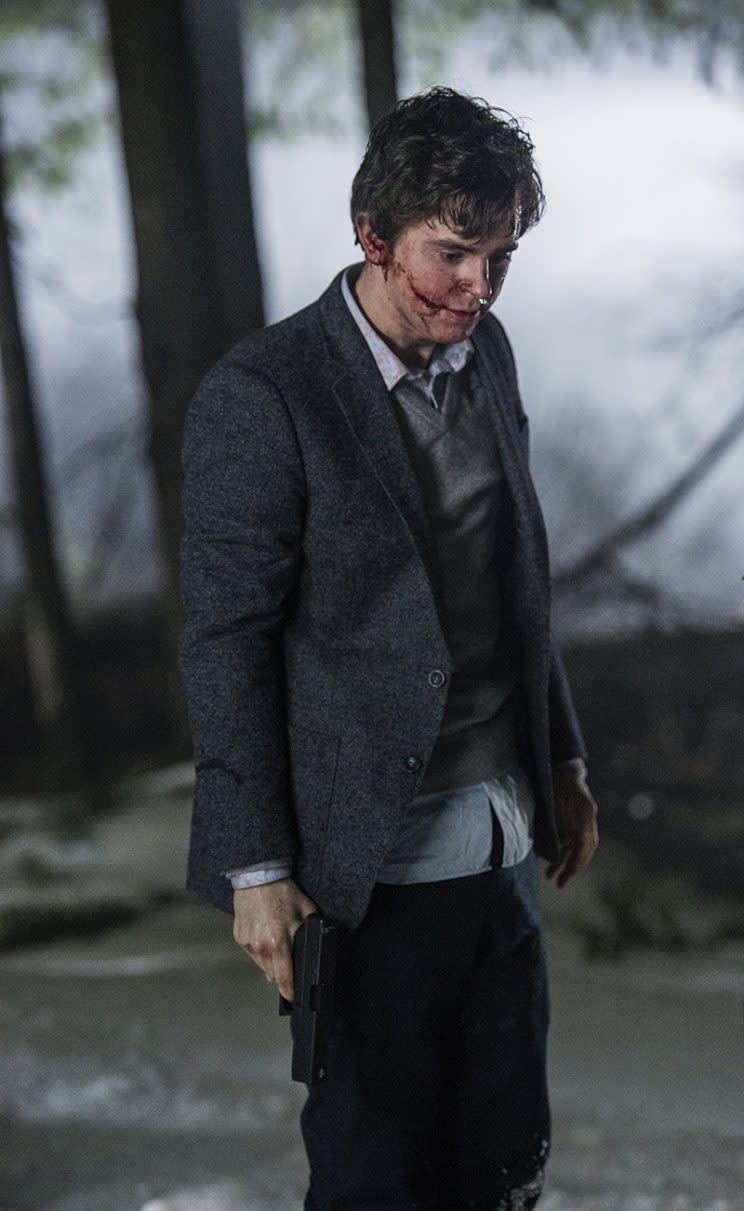
Norman was at his most complicated this season, and Freddie was juggling portraying all that with also writing an episode and directing for the first time. And the episode he directed, “The Body,” was one of the most complicated and physical for Norman. How do you describe watching his performance and juggling all these other roles this season?
Ehrin: He’s an impressive person. The [Season 4 finale] was kind of a game changer for his character and put a lot more on Freddie’s shoulders once Norma had died. Once we saw that episode, we felt very comfortable that the last season was going to be really great. He’s clearly up for it, you know? Doing all the layers and all the internal arcs you have to do… there’s no words for it. He’s conveying all this stuff without words. It’s so layered and specific, because it’s like doing multiple characters at once in a scene. So, so, so good. Not a false beat all year.
One unanswered question viewers may have: What happened to Dr. Edwards? Should we assume he’s dead, since we know he isn’t writing prescriptions anymore?
Ehrin: Yes.
Cuse: We thought it was clear. It’s funny, it’s one of those things that seemed to us clear that the audience would understand that he was just appearing in Norman’s imagination. But I guess it was more ambiguous than we intended.
Was there any other path Norman could have taken at the end, or at any point in the last half of the season before he confessed?
Cuse: Well, he could have sold Herbalife, but we dismissed that fairly early on.
Ehrin: That’s the next show I want to do. “I used to be a serial killer, but now I sell Herbalife!”
Cuse: We always saw the show as a romantic tragedy, and for us the definition of romantic tragedy is the audience is hoping against hope that they will not meet their inevitable end. The inevitable-end part is what makes tragedy such a poignant part of storytelling, and it was always our desire to make the audience passionately hope that something else would happen, but inevitably this was the only thing that could happen. That was the fundamental approach that we took.
Do you think Norman was doomed, that this was his fate before he was even born, just because of everything that had happened to Norma?
Ehrin: No, I think in a different environment… I’m a huge proponent of therapy. I think with therapy and education, there could’ve been a completely different outcome. I remember when we were at the TCAs in the very beginning, and they were like, “Why do you want to do this show?” I remember us saying, “To maybe shed some light on mental illness, on dysfunction.” And I feel like that has actually been rewarding, to have done this show, but also done it through the lens of humanity to the extent that we could. That was what we tried to do.
Read more from Yahoo TV:
• ‘Bates Motel’ Series Finale: Ken Tucker’s Spoiler-Free Review
• 5 Shows to Watch This Week
• How ‘Silicon Valley’ Star Zach Woods Makes Each Character His Own


